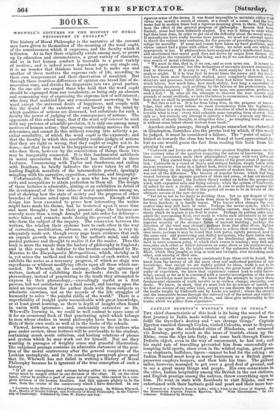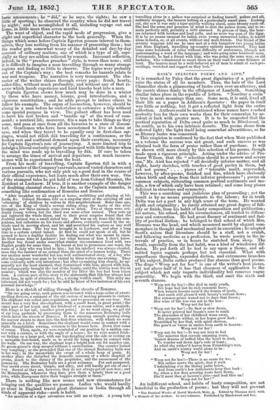CAPTAIN EGERTON'S WINTER'S TOUR IN INDIA. * THE chief characteristic of
this book is its being the record of the first journey in India made without any other purpose than to fulfil the traveller's destiny and "see strange things." Captain Egerton rambled through Ceylon, visited Calcutta, went to Nepaul, looked in upon the celebrated cities of Hindostan, and returned via Bombay, pretty much as the mass of tourists steam up the Rhine, cross the Alps into Italy, and come back through France. Definite object, even in the way of amusement, he had not ; and his rapid rate of travelling prevented him from successfully at- tempting field-sports, since even in the wildest region, great game —as elephants, buffaloes, tigers—cannot be had for the asking : an Indian Nimrod must keep as many huntsmen as a British game- preserver employs keepers, and then bide his time. The gallant sailor, however, managed to get over a good deal of ground, and to see a great many things and people. His own connexions in the cities, Indian hospitality among the British in the out stations, and English prestige among the natives, threw everything open to him. Ile went in state with Residents to visit Rajahs, and was
• entertained with their barbaric gold and pearl and their more bar
-
• Journal of a Winter's Tour in India; with a Visit to the Court of Nepaul. By the Honourable Captain Francis Egerton, R.N. With Illustrations. In two volumes. Published by Murray.
bark amusements ; he "did," as he says, the sights ; he saw a little of sporting; he observed the country when he did not travel by nigh. t; and he accomplished it all, including voyage out and home, in little more than seven months.
The want of object, and the rapid mode of progression, give a slight and superficial character to the book generally. When the things which come before Captain Egerton possess interest in them- selves, they lose nothing from his manner of presenting them ; but the reader gets somewhat weary of the detailed and day-by-day account of ordinary matters, one of which is a type of all, espe- cially as they are seldom relieved by remark. Incessant reflection, indeed, in the " preachee preachee style, is worse than none ; still it is difficult to imagine a man travelling through so many strange regions and finding so little to observe. The topics were probably out of the Captain's way ; the best remarks he hazards relate to war and weapons. The narrative is very transparent. The cha- racter of the writer shines through every page ; frank, hearty, sailor-like, without much profundity, and without any of that re- serve which harsh experience and hard knocks beat into a man.
Captain Egerton shows how much may be done in a winter by those who have money, leisure, good introductions, and a vigorous constitution ; and he adds precept to induce others to follow his example. The organ of locomotion, however, should be strong in a man before he undertakes so extensive a trip without some special purpose in view. The gallant officer has been used to have his rest broken and "tunable up" at the word of com- mand; a nautical life, moreover, fits a man to take things as they come, and pass at once from all the luxuries to a state of discom- fort. Gentlemen who have been accustomed to live at home at ease, and when they travel to be equally easy in first-class car- riages, would not relish &I travelling for a continuance, or the broken rest and continual demand upon their exertions, necessary for Captain Egerton's rate of journeying. A more limited trip to indulge a liberal curiosity might be managed with little fatigue when the mind was made up to travelling by (la. If care be taken to arrange the times of arrival and departure, not much inconve- nience will be experienced from the heat.
From his mode of travelling, Captain Egerton fell in with a great number of the Company's servants, men of varied characters and various pursuits, who not only pick up a good deal in the course of their official experience, but learn much after their own way. One of the strangest tales he got hold of was from Colonel Sleeman, the Resident at Lucknow. If true, it is another example of the danger of doubting classical stories ; for here, as the Captain remarks, is something like confirmation of Romulus and Remus.
"After breakfast we all stopped at home, scribbling and playing at bil- liards, &c. Colonel Sleeman told us a singular story of the carrying off and educating' of children by wolves in this neighbourhood. Some time ago, two of the King of Oude's suwars riding along the banks of the river Goomptje, saw three animals come down to drink. Two of them were evi- dently young wolves, but the third was some other animal. They rode up and captured the whole three, and to their great surprise found that the doubtful animal was a small naked boy. He was on all fours like his com- panions, had callosities on his knees and elbows, evidently caused by the at- titude used in moving about, and bit and scratched his captors as any wolf might have done. The boy was brought in to Lucknow, and after a long time to a certain extent tamed. At first he could not speak at all, but he seemed to have a doglike facility for finding out what was meant by signs. He lived some time at Lucknow ; but what became of him I don't know. Another boy found under somewhat similar circumstances lived with two English people for some time. He learnt at last to pronounce one word, the name of a lady who was kind to him ; but his intellect was always clouded, more like the instinct of an animal than the mind of a human being. There was another more wonderful but less well authenticated story, of a boy who after his recapture was seen to be visited by three wolves one evening. They came evidently with evil intentions ; but after examining him closely, he ap- parently not the least alarmed, they fraternized with him, played with him, and subsequently brought the rest of the family, until the wolves were five in number ; which was also the number of the Litter the boy had been taken from. A. curious part of this story is the statement, that this boy always had about him, in spite of ablutions, &c., a strong wolfish smell. This story my informant did not vouch for ; but he said he knew of five instances of his own personal knowledge."
Here is a sketch of riding through the streets of Benares.
"On our going away, each person was invested with a large collar of sweet- smelling flowers, a remnant of the old custom of making presents to visitors. The elephant was called into requisition, and we proceeded on our tour. Our mount was a very fine she-elephant, with a small head, (a great point,) the upper part of her trunk and her forehead of a cream colour, and a magnifi- cent fringe to her tail, (another great point.) As we went along, we got rid of our long garlands by presenting them to the numerous Brahminy bulls which infest the streets of Benares. It was amusing enough. passing along the narrow streets to stare into the first-floor windows, with which we were generally on a level. Sometimes the elephant would come in contact with a slight verandahlike awning, common to the houses here. Down that came of course. Then, again, we were reminded of our position by a sudden con- tact with a cornice, or with the angle of a house ; for we were seated Irish- car fashion on a large pad, with our legs dangling over the aide or resting on a moveable foot-board, made so to avoid its being broken by contact with the walls. On our way, the elephant kept a bright look out for number one. No green-grocer's shop escaped without a contribution. One counter looked very tempting ; so she pretended that one of the eternal Brahmin), bulls was in her way ; in the meanwhile she swept off a whole heap of grain. At another place she disturbed the domestic economy of a whole shopfull of greens, much to the dismay of the proprietor, and the amusement of the passers-by. The Brahminy bulls are a great nuisance. Fat and pampered, they crowd every street, temple, and alley, and will hardly get out of one's way. Sacred as they are, however, they do not always get off scot-free ; and the Mussulmans, whenever they dare, give them a hearty blow or a good poke, while Europeans drive their buggies straight at them."
There is nothing like new scenes and new circumstances for bringing out the qualities we possess. Ladies who would hardly go alone in England travel great distances in India through all kinds of apparent risks—such is habit. "An anecdote of a tiger adventure was told me at Gyah. A young lady travelling alone in a palkee was surprised at finding herself, palkee and all, suddenly dropped, the bearers bolting at a particularly smart pace. Looking out, she saw it was only a tiger quietly walking about, some twenty yards off. She had the sense and presence of mind to shut the palkee doors, and to re- main perfectly still, probably a little alarmed. In process of time, the bear- ers returned with torches and loud yells, and no more was seen of the tiger. It is by no means unusual for ladies, even young unmarried ladies, to travel alone in India, or, at all events, without any male friends. Our friend of the seventy waggons told me he once met at a dilk bungalow two young ladies just from England, travelling up-country entirely unprotected. They had come some hundreds of miles without difficulty or annoyance, (though not understanding a word of the language,) and were going some hundreds more. Fortunately, he had a friend with him, who was going the same way, an old bachelor, who volunteered to escort them on their road for some distance at least. The bearers must be a well-behaved set of men to admit of such pro- ceedings, wretched and ragged as they look."



























 Previous page
Previous page